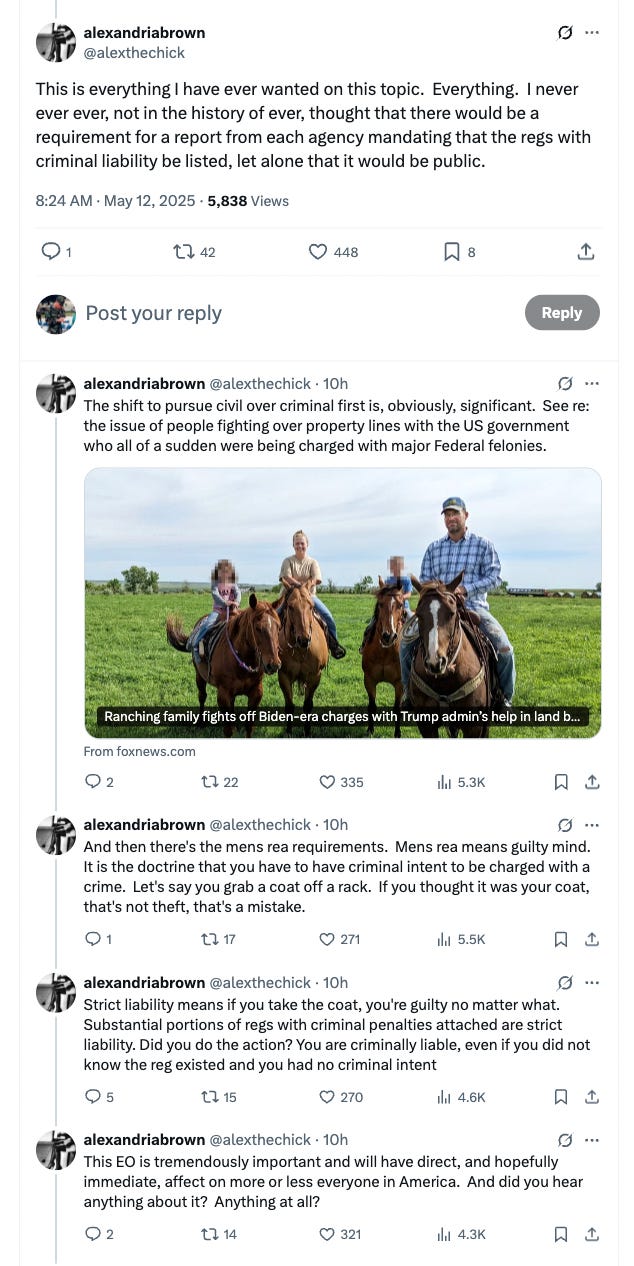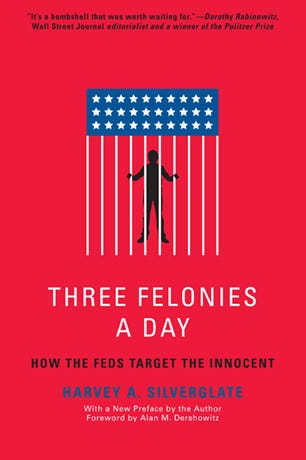Big Trump Action Goes Mostly Unnoticed
worst hitler ever
Donald Trump just made it harder to go to federal prison.
On Friday, President Trump issued a new executive order with a remarkably broad scope and deep implications, under the title “Fighting Overcriminalization in Federal Regulations.” It starts with plain, clear, direct language:
The Code of Federal Regulations contains over 48,000 sections, stretching over 175,000 pages — far more than any citizen can possibly read, let alone fully understand. Worse, many carry potential criminal penalties for violations. The situation has become so dire that no one — likely including those charged with enforcing our criminal laws at the Department of Justice — knows how many separate criminal offenses are contained in the Code of Federal Regulations, with at least one source estimating hundreds of thousands of such crimes. Many of these regulatory crimes are “strict liability” offenses, meaning that citizens need not have a guilty mental state to be convicted of a crime.
This status quo is absurd and unjust. It allows the executive branch to write the law, in addition to executing it. That situation can lend itself to abuse and weaponization by providing Government officials tools to target unwitting individuals. It privileges large corporations, which can afford to hire expensive legal teams to navigate complex regulatory schemes and fence out new market entrants, over average Americans.
Moving to address the overcriminalization of federal regulations, the order flatly declares, “It is the policy of the United States that…criminal enforcement of criminal regulatory offenses is disfavored,” while adding, “Agencies promulgating regulations potentially subject to criminal enforcement should explicitly describe the conduct subject to criminal enforcement, the authorizing statutes, and the mens rea standard applicable to those offenses.”
Mens rea is a guilty mind. Imposing a mens rea standard on federal prosecutions for regulatory offenses means that the government will be expected to stop prosecuting people who didn’t know they were doing something illegal, or people whose guilty mind — their knowledge that they were doing something illegal, and meant to — can’t be proved. It makes federal prosecution harder, less likely, and probably less common.
The first subtext of this executive order is federalism: moving ordinary criminal prosecution back to the states, after decades in which the list of federal crimes has grown so sharply that no one can possibly know them all. The second subtext is about constitutional order: passing what has amounted to lawmaking from the administrative state back to Congress.
The third piece of subtext is demystification, and the order also requires every federal agency to compile, keep current, and make public a list of regulations that carry criminal penalties for violations.
Surprisingly few people have noticed the thing, which somehow mostly hasn’t made the news. Reuters and the AP both wrote stories, but those stories haven’t been picked up widely. My first thought was to go see how the actual libertarian narrative mothership covered a libertarian grand slam, but I couldn’t find any mention of it.
Among people who’ve been thinking about federal prosecutions and regulatory overreach, the reaction is highly enthusiastic:
Harvey Silverglate, the criminal defense lawyer who wrote the book on the explosion of federal crimes…
…is an old school 1960s liberal, now in his 80s, who’s not enthused by the current administration. But he responded to my request for comment immediately. "I'm not generally a Trump fan,” he said, “but even a stopped clock is right twice a day."
Silverglate views the executive order as a necessary corrective, in a world in which "people commit crimes without even knowing it." It’s the nature of the federal criminal code, he says. Consistent with a founding vision in which a general government handled foreign affairs and interstate problems for a coalition of sovereign states that managed their own internal regulation, states have common law jurisdiction, and are the presumptive authorities on the things you already think of as crimes, like robbery and murder.
The federal government doesn’t have common law jurisdiction, and so has spent 250 years building a growing list of statutory crimes that focus on the interstate nature of the offense, as in mail fraud. “They define the means,” Silverglate says, “but not the crime.” Here’s a good historical summary of the growth of federal criminal offenses, if you’re interested.
Why has Trump tackled a well-known problem that no one else has lifted a finger to address?
"Because he's been a victim of this,” Silverglate says. “He's the first president who's been indicted." I would like to thank Norm Eisen for being dumb enough to trigger this important shift in our political culture.
My suspicion is that discussion about this executive order will gain steam as people take notice of it, against the momentum of the dunderheaded and inflexible Orange Man Bad presumption in newsrooms. It’s a more significant development than the limited notice implies. Take a few minutes to read the order yourself.
More to come.




A House committee covered the problem in this hearing on the 7th. "Criminalizing America: The Growth of Federal Offenses and Regulatory Overreach": https://judiciary.house.gov/committee-activity/hearings/criminalizing-america-growth-federal-offenses-and-regulatory-0
A Cato Institute person checked in with some testimony. Jonathan Turley as well.
Chris might take special note of this from the Tolman testimony:
"Take, for example, the recent case against Charles and Heather Maude. Under the Biden DOJ,
criminal charges were brought against the Maudes, a South Dakota family who has a small cattle
and hog operation. This family endured a senseless politically motivated prosecution waged by the
Biden Administration over 25 acres of federal land.
"The Maudes were not criminals. They fenced in land that had been part of their ranch for over 100
years. But, empowered by pointless laws and unfettered discretion, the minor land dispute
devolved into an overzealous criminal prosecution. No criminal penalty should have even existed
for a land dispute. And the Maudes should never have been charged."
Now, we need it ensconced in a way that the next admin can't just repeal with another EO.